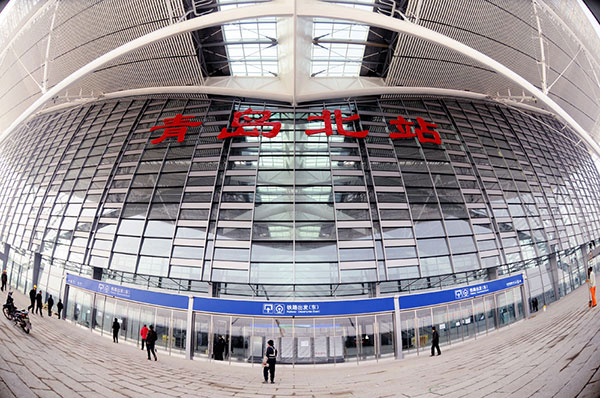 |
|
Qingdao North Railway Station embraces huge commercialopportunities. [Photo provided to chinadaily.com.cn] |
The thriving East Chinese city of Qingdao will welcome a new subway system, which is also the first subway in Shandong province, by December 16, when trial operation begins.
Connecting the Qingdao North railway station, the newly launched subway will usher in a new era for the bustling commerce and circulation industry in Licang district, which a majority of the metro line runs through.
At the moment, a fast growing number of businesses are moving into Zhongfang, an underground business street with a total space of 260,000 square meters, where the Licun subway stop is.
Underground spaces will link the busy department stores of Qingdao, where visitors rub shoulders day and night, to subway stops, making shopping more accessible and convenient.
Apart from the M3 line which will open by the end of the year, the M2 line will also pass through Licang in 2017.
As a transit hub for the two lines, the Licang Subway Complex will have a built-in floor space of 120,000 square meters with 4 levels underground. The complex will have a business space of 50,000 square meters. Its ground space will be a park and also a plaza for locals to lounge around and enjoy their leisure time.
Several stores will be open by the end of the year, welcoming subway riders on the M3 and the overall project will be complete by May 2016.
At the crossing of Jingkou road and Junfeng road, a 'tea culture city' is being raised and will become a feature stop for the M3.
With a total investment of 10 million yuan, the Tiandu Tea Culture City will have a floor space of 40,000 square meters. The complex will have a number of boutique stores, supermarkets, a tea museum, a food court, as well as 123 residential houses and 9 business offices.
Weng Xingdeng, an investor of the project, said there are more than 2000 tea merchants from South China doing business in Qingdao. Each year, thousands of tons of tea are transported to Qingdao and sold across North China.
"The Tea Culture City will feature the headquarters of tea businesses in North China and enhance the branding of Qingdao as a hub for tea commerce in the north," he said.
The complex is located 10 minutes' drive from the Qingdao North Railway Station.
The northernmost station of the M3 is the Qingdao North Railway Station, which is the largest transportation hub in Shandong province.
Resembling a gigantic flying seagull, it opened to passengers in January 2014 and handles an estimated 9.25 million passengers per year, a figure that could rise to 18 million by 2020.
The station now handles an average of 50,000 passengers every day and more than 300,000 people come to the station every day, according to official data.
A total of 100 thousand square meters of commercial space is being built on the east and west plazas at the station with a wide array of stores and sufficient parking lots.
A 36-sq-km area around the station is being transformed into Qingdao Traffic Business District, in a bid to revamp the original industrial hub into a service oriented new urban center.
"The train station will be a comprehensive transit hub with huge commercial opportunities integrating resources and values brought by subway, high speed train railway, intercity coach and local buses," said Pei Chunguang, deputy general manager of Qingdao Hicreat, Licang's state owned infrastructure developer.
